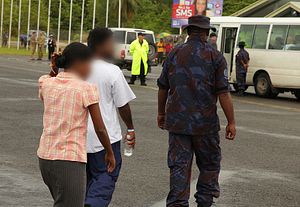World leaders at the Asia-Pacific Economic Cooperation (APEC) Forum, which Papua New Guinea is hosting this week in Port Moresby, have the power to help some of the world’s most vulnerable and traumatized people.
It is urgent, and long overdue. Preparations for the APEC Forum itself show why: Just days ago, people seeking asylum and refugees in Port Moresby for medical treatment were taken away from their lodgings by authorities and hauled back into detention on Manus Island. They were told this was to free up hospital staff “to be able to treat delegates and conference employees” when APEC begins.
One of these men was awaiting hernia surgery before his forcible transfer back to Manus Island. On his return to Manus, he doused himself in petrol and attempted to set himself alight before others intervened.
In the last two months, at least five others have attempted to end their lives.
These people in detention limbo on Manus are in urgent need of APEC’s leadership and humanity. Their current ordeal is entirely the making of one APEC country, Australia, abetted by another, Papua New Guinea, with Australia’s funding. Meanwhile the United States and New Zealand, fellow APEC members, have offered to be part of the solution.
The people Australia condemns to indefinite offshore detention – the men on Manus, in PNG, and the men, women and children in Nauru – have spent years in miserable uncertainty. This is a cruel punishment, and unfair backlash for their legitimate quest for safety on Australian soil.
Australia’s hardliners call it “stopping the boats.” Many more call it cruel and inhumane. The damage of this policy is clearer and more disturbing by the day.
Suicide and self-harm are clearly on the rise. Having faced the combined trauma from the situations they fled and the ordeal of indefinite detention since, these people must now endure Australia’s decision to cut health services, halve the number of mental health workers, and shut down trauma and torture counselling in the open air prison it created in Papua New Guinea.
Health services for the specific needs of refugees and people seeking asylum are woefully inadequate. Those evacuated from Manus to Port Moresby present serious health conditions, including severe mental health issues. And even though some of these conditions cannot be treated in Papua New Guinea, the Australian government has refused to treat these men in Australia.
Moreover, refugees and asylum seekers tell us of their constant and well-founded fear for their safety, both in Port Moresby and in Manus – including accounts of stabbings, machete attacks, and death threats from local residents.
Now, with world leaders about to sign on to a Global Compact for Refugees and a Global Compact on Migration, APEC leaders have an opportunity to put this into practice and rise to the crisis with compassion and partnership. There could be no better demonstration of true cooperation and solidarity than a newfound pledge to regional protection mechanisms, for people and families simply seeking safety.
Australia must reverse its opposition to joining the Global Compact and show its commitment to these initiatives, beginning with urgently ending its offshore refugee detention policies. And while it continues to unlawfully trap refugees on Manus, Australia should immediately bring them to Australia, or in the very least facilitate offers for their relocation to New Zealand and the United States, and seek other settlement arrangements with other third countries.
The clock is ticking. All must be moved to a safe country — and those with serious physical and mental health conditions should immediately be brought to Australia for urgent medical care.
Reports of attempted suicide are reaching us with alarming frequency. Several men have already taken their lives in Manus and Nauru. Will APEC leaders stand by while Australia continues to harm hundreds?
Australian authorities recently announced plans to relocate children detained in Nauru to Australia by Christmas – a tacit admission that their policy is untenable. But so is the crisis in Manus, where the same policy is creating the same traumatic climate for the refugees and asylum seekers confined there.
All have suffered enough. APEC leaders can make it stop.
Nicholas Bequelin is Amnesty International’s Regional Director for East and Southeast Asia.

































